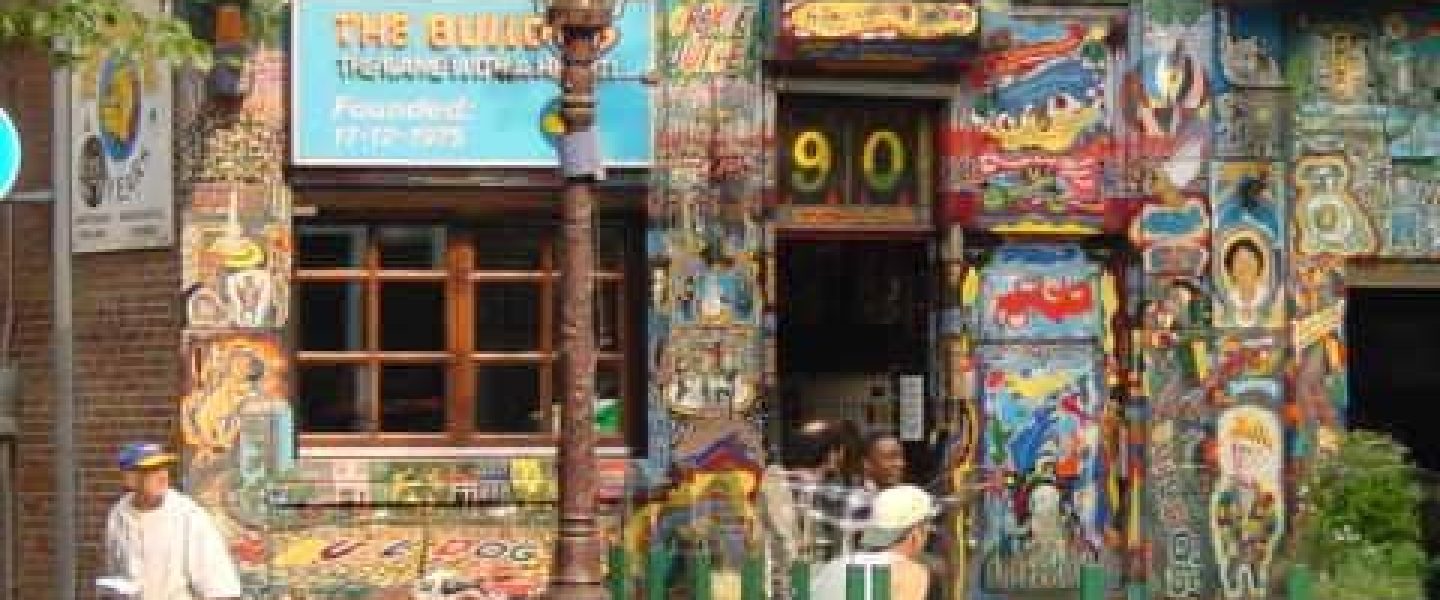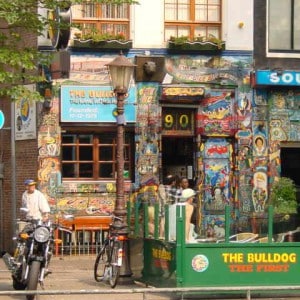The US states of Colorado and Washington voted last year to legalize marijuana and are moving forward toward implementing legalization. Activists in several states are lining up to try to do the same next year, and an even bigger push will happen in 2016. With public opinion polls now consistently showing support for pot legalization at or above 50%, it appears that nearly a century of marijuana prohibition in the US is coming to an end.
Exactly how it comes to an end and what will replace it are increasingly important questions as we move from dreaming of legalization to actually making it happen. The Netherlands, which for decades now has allowed open marijuana consumption and sales at its famous coffee shops, provides some salutary lessons — if reformers, state officials, and politicians are willing to heed them.
To be clear, the Dutch have not legalized marijuana. The marijuana laws remain on the books, but are essentially overridden by the Dutch policy of “pragmatic tolerance,” at least as far as possession and regulated sales are concerned. Cultivation is a different matter, and that has proven the Achilles Heel of Dutch pot policy. Holland’s failure to allow for a system of legal supply for the coffee shops leaves shop owners to deal with illegal marijuana suppliers — the “backdoor problem” — and leaves the system open to charges it is facilitating criminality by buying product from criminal syndicates.
Still, even though the Dutch system is not legalization de jure and does not create a complete legal system of marijuana commerce, reformers and policymakers here can build on the lessons of the Dutch experience as we move toward making legal marijuana work in the US.
“Governments are looking to reform their drug policies in order to maximize resources, promote health and security while protecting people from damaging and unwarranted arrests,” said Kasia Malinowska-Sempruch, Director of the Open Society Global Drug Policy Program. “The Netherlands has been a leader in this respect. As other countries and local jurisdictions consider reforming their laws, it’s possible that the Netherlands’ past offers a guide for the future.”
A new report from the Open Society Global Drug Policy Program lays out what Dutch policymakers have done and how they have fared. Authored by social scientists Jean-Paul Grund and Joost Breeksema of the Addiction Research Centerin Utrecht, the report, Coffee Shops and Compromise: Separated Illicit Drug Markets in the Netherlands tells the history of the Dutch approach and describes the ongoing success of the country’s drug policy.
This includes the separation of the more prevalent marijuana market from hard drug dealers. In the Netherlands, only 14% of cannabis users say they can get other drugs from their sources for cannabis. By contrast in Sweden, for example, 52% of cannabis users report that other drugs are available from cannabis dealers. That separation of hard and soft drug markets has limited Dutch exposure to drugs like heroin and crack cocaine and led to Holland having the lowest number of problem drug users in the European Union, the report found.
Pragmatic Dutch drug policies have not been limited to marijuana. The Netherlands has been a pioneer in harm reduction measures, such as needle exchanges and safe consumption sites, has made drug treatment easy to access, and has decriminalized the possession of small quantities of all drugs. As a result, in addition to having the lowest number of problem drug users, Holland has virtually wiped out new HIV infections among injection drug users. And, because of decriminalization, Dutch citizens have been spared the burden of criminal records for low-level, nonviolent offenses.
The Dutch have, for example, virtually eliminated marijuana possession arrests. According to figures cited in the report, in a typical recent year, Dutch police arrested people for pot at a rate of 19 per 100,0000, while rates in the US and other European countries were 10 times that or more.
For veteran drug reform activist Joep Oomen of the European NGO Coalition for Just and Effective Drug Policies (ENCOD), the report is welcome but not exactly “stop the presses” news.
“The conclusions of this report have been known for a long time,” he told the Chronicle. “Already by the end of the 1990s, when European governments had to acknowledge that Dutch drug policies had proven more effective in reducing risks and harms than many other countries, the criticism that had been expressed earlier by mainly German and French heads of state was silenced. For instance, in the Netherlands the age of first heroin use is the highest of Europe, which is explained by the relative tolerance concerning cannabis use.” [Ed: A high age of first use is considered good, because it means that fewer people are experimenting with a drug when they are young — which in turn means fewer people ever trying it, and those who do being more likely to be capable of avoiding problematic use.]
While the Dutch can point to solid indications of success with their pragmatic drug policies, it is not all rosy skies. The “back door problem” alluded to above continues unresolved, and the relative laxness of Dutch marijuana policy has led to an influx of “drug tourists,” especially from neighboring countries, such as France and Germany. Both of those irritants have provided fodder for conservative parties and administrations that have sought to roll back the reforms.
“There seems to be more admiration for Dutch drug policy outside the Netherlands than inside,” Oomen observed. “Right-wing governments that have dominated the Dutch political climate since 2002 have slowly dismantled acceptance-oriented drug policy. Lately the establishment of the Weedpass in the southern part of the country [which excludes non-Dutch from access to the coffee shops] and new measures against grow shops and coffee shops are definitely threatening to undermine the coffee shop model,” he said.
“Instead of completing the regulation of this model by solving the coffee shops’ back door problem, the government seems to apply a policy of slow elimination by making the conditions worse in which the shops have to operate,” Oomen continued. “And the Dutch press follows blindly, often referring to coffee shops as a link in a criminal chain, which is unavoidable since the ban on cultivation forces shop owners to deal with criminals, but without questioning the measures that reinforce the criminal aspect.”
While the national government may now be hostile to pragmatic marijuana policies, it is facing considerable resistance from elected officials. The Weedpass program now appears to be largely a dead letter, thanks to opposition from the likes of Amsterdam Mayor Eberhard van der Laan, and other local elected officials are moving to address the back door problem.
“Several Dutch mayors have plans for municipal cannabis farms to supply the coffee shops and take crime out of the industry,” said Grund, research director at the Addiction Research Center. “But if Dutch drug policy offers one lesson to foreign policymakers, it is that change should be comprehensive, regulating sale to consumers, wholesale supply and cultivation.”
Grund is watching the American experience with legalization in Colorado and Washington and had some observations he shared with the Chronicle.
“As far as I can judge,” he said, “these are both pretty solid proposals, although quite different in detail and approach — e.g., a vertically integrated chain of supply in Colorado and separate licensing for producers, processors, and retailer in Washington. Clearly in both states legislators have done their best. Interesting then, that they end up with rather different plans, which is actually fine, as it provides us with the opportunity to evaluate different models. For more than 25 years, there was just about only the Dutch experience with cannabis decriminalization and coffee shops; now we see different models of cannabis reform and distribution being implemented across continents. Comparing these experiences as they evolve should allow us to develop more effective drug policies.”
Policymakers and regulators should try to avoid rigidity and be ready to deal with unintended responses and consequences, the Dutch social scientist said.
“The point is to approach these flexibly and pragmatically; adjust when necessary, while keeping your eyes on the ball: cutting the link between cannabis on the one hand, and criminal records, mafia and more, on the other,” Grund advised, noting that the 1976 Dutch law separating hard and soft drugs did not anticipate the arrival of the coffee shop phenomenon. “As Dr. Eddy Engelsman, former chief drug policy maker at the ministry of health — and known as the architect of Dutch drug policy — said when we interviewed him, ‘coffee shops just emerged.’ The policymakers deemed that these fit their overall policy objectives and allowed for them to ply their trade openly,” he recalled.
Grund also weighed in on personal cultivation — Colorado allows it; Washington does not — and public use, which it appears will remain forbidden in both states.
“I think Washington presents more of a business and revenue raising strategy, while Colorado feels more like grassroots meets civil libertarian meets amenable regulator,” he opined. “The more social, homegrown orientation of the Colorado proposal – allowing for home growing, bartering between friends — could perhaps engender a less market driven distribution structure, where friends compete in growing the most pleasant marijuana, not the most profitable. Something like the Spanish cannabis clubs,” he suggested.
Public, convivial pot smoking in designated areas should be allowed, Grund said, because it has benefits.
“Dedicated places of consumption — such as the coffee shops in the Netherlands or shisha parlors — offer an opportunity to promote responsible behavior around cannabis consumption,” he argued. “Smoking cannabis in a safe, hospitable and stress free environment engenders different use patterns from quickly getting high in a service ally behind a bar or in a car parked in a quiet place. Coffee shops offer a moderating environment where self regulation is supported by social learning and control.”
While Grund was looking forward to the future in the US, Oomen was thinking of the unfinished business in the Netherlands, but his musing also provide food for thought for American reformers, especially those contemplating decriminalization measures.
“The lesson here is that decriminalization or depenalization are useful concepts for a transition period, but real progress can only be obtained and assured with legal regulation of the entire chain from producer to consumer,” the ENCOD leader noted. “The Dutch case shows that politicians will always use the smallest margin they have to maintain to a repressive model, provoking criminal activities which they can use to justify their policies publically. This is the drug policy perpetual motion machine.”
Colorado and Washington are already well down their particular paths to marijuana legalization. But there is still time for the next wave of legalization states to learn and apply those lessons, not just from Denver and Olympia, but from the Dutch pioneers as well.
Article From StoptheDrugWar.org - Creative Commons Licensing - Donate



























